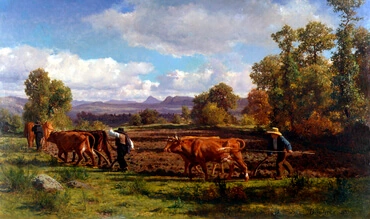属天的奥秘#7632
7632. “我使他的心发沉, 使他臣仆的心发沉” 表他们仍旧固执, 并且彼此都是一样的. 这从 “发沉”, “刚硬”, “使心坚硬” 的含义, 以及法老的代表清楚可知: “发沉”, “刚硬”, “使心坚硬” 是指固执 (参看7272, 7300, 7305节); 心发沉的法老是指那些进行侵扰的人, 当经上说 “他和他臣仆” 时, 所表示的是彼此都是一样的, 因为臣仆和他一起构成他的家. 当经上说 “耶和华使法老的心发沉” 时, 内义上的意思是说, 法老使自己的心发沉. 古时, 为了简单人的缘故, 所有坏事都被归与耶和华; 这是因为简单人不可能知道, 并且大多数也不明白所生的事, 其源头除在耶和华里面外, 还能在哪里. 他们也不知道如何理解这一真理: 耶和华容许魔鬼团伙造成邪恶, 并不阻止他们, 尽管祂拥有一切能力. 由于简单人不明白这些事, 甚至连聪明人也几乎不明白, 所以才照着多数人所认为的说, 甚至邪恶也源于耶和华. 这是圣言的一个共同特征, 圣言的字义适合简单人的信仰. 在圣言中被归与耶和华的邪恶来源于人 (参看2447, 6071, 6991, 6997, 7533节).
Ground

“Earth” refers to the externals of a person or a community -- their everyday thoughts and actions -- in a broad, general sense. “Ground” refers to the parts of our external lives that are ready for cultivation, ready to be put to use. Cultivation, of course, involves loosening up the soil (breaking down our distracting habits and thoughts) and planting seeds (true concepts and ideas that spring from a desire to be good). As those seeds start growing, we begin to be truly useful. In short, then, “ground” in the Bible can mean a person or community that is receptive to the Lord's teaching. It can also mean a person or church that has received the Lord's teaching and is putting it to use.






